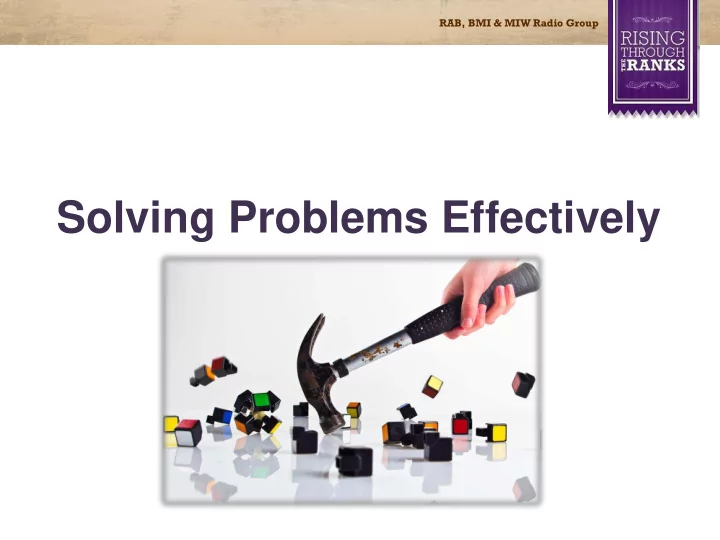

RAB, BMI & MIW Radio Group Solving Problems Effectively
RAB, BMI & MIW Radio Group Which is worse? Making a bad decision? or Making no decision?
RAB, BMI & MIW Radio Group Why We Avoid Decisions • Don’t want to make a mistake • Hope problem will self-correct • Don’t want to overstep authority • Don’t want to anger others • Don’t want to offend others • Don’t have time to think it through • Don’t have a good problem solving system
RAB, BMI & MIW Radio Group Problem Types Organizational / Structural • Operational • Budgetary • Technical • Top down • Bottom up • Across Which of these is toughest?
RAB, BMI & MIW Radio Group Problem Types People • Performance • Social • Personal Which of these is toughest?
RAB, BMI & MIW Radio Group Methods to Solve Problems Knee-Jerk? Shoot first and ask questions later? Procrastinate? Wait long enough and problem will fix itself or go away? Strategic? Use a system that is • Consistent • Thorough • Thoughtful • Participatory • Fair Hope… Is not a strategy!
RAB, BMI & MIW Radio Group Problem Solving Strategies Work backwards – Start with a favorable outcome and trace backwards Solve a simpler problem – Break it down into small sub-goals The way in which we approach and solve complex problems is a major factor in our success as a Manager
RAB, BMI & MIW Radio Group Steps to Effective Problem-Solving 1) Define the Problem 2) Set the priorities “Seek first to understand… then to be understood.” 3) Get all the facts 4) Solicit input Think Win/Win 5) Consider options Habit 4, The 7 Habits of Highly Effective People: Steven R. Covey 6) Make your decision 7) Communicate the decision 8) Monitor progress
RAB, BMI & MIW Radio Group 1. Define the Problem – (Write it Down) List the organizational components • What’s causing the problem? • What’s contributing to the problem? • What’s preventing a solution? List the people components • Who’s causing the problem? • Who’s contributing to the problem? • Who’s preventing a solution?
RAB, BMI & MIW Radio Group 2. Set the Priorities How important is this problem? • Prioritize – Scale of 1-10 • Don’t sweat the small stuff? • What’s the worst case scenario? • What’s the best case scenario? Is your intervention really required? • Can it /should it be delegated? Who can help solve the problem? • Identify allies and partners What’s the time frame for a solution • Establish a timeline
RAB, BMI & MIW Radio Group 3. Get All the Facts List the organizational obstacles • Systems • Technical • Paradigms List the people obstacles • Knowledge / ability • Understanding • Attitude / style • Generation • Fear • Personal
RAB, BMI & MIW Radio Group 3. Get All the Facts (continued) Determine your position? • Strength or weakness • Can you make the decisions? • Can you enforce the decision? • Do you need authority / buy-in? Will behavioral style play a role? • Will you need to adjust to get buy-in? Who is / will be effected? • Inside the problem • Outside the problem
RAB, BMI & MIW Radio Group 4. Solicit Input • Get information from direct parties • Get information from affected parties • Get information from trusted parties • Ask for their recommendations • The power of “Tell me about that” • Get advise from superiors • Get advice from peers
RAB, BMI & MIW Radio Group 5. Consider the Options: • What’s the best outcome you’re hoping for? • What’s the worst that could happen? • Are you prepared to make tough decisions? • You must treat everyone FAIRLY • But that does not mean treating everyone EQUALLY • Always think: Win/Win
RAB, BMI & MIW Radio Group 6. Make Your Decision • Whenever possible, let the affected / offending parties devise the solution • Take time to think before you act • Use logic, guided by emotion • Be fair, Be firm, Be consistent • Establish a timeline for implementation • Prepare your communication • Be flexible and willing to change course if and when necessary
RAB, BMI & MIW Radio Group 7. Communicate the Decision • Re- state the problem and… – Effect on organization and people – Rationale for the decision • Clearly explain the details of the solution – How the solution will be implemented – Who will implement the solution – How the solution will be supported – How progress will be measured – Benefits of making the change – Consequences of non-compliance – Your appreciation of their support and cooperation
RAB, BMI & MIW Radio Group 8. Monitor Progress • Establish a specific reporting system • Set firm times for reviews • Communicate clearly and honestly • Determine & fix system impediments • Praise / reward for success • Follow through on consequences for lack of success • Support and encourage everyone involved
RAB, BMI & MIW Radio Group Effective Problem Solving • As Managers, we like to think it’s possible to make big , sweeping changes! • In truth, successful, meaningful change occurs: – In small strategic pieces… – That take organization structure, systems and PEOPLE into account… • Job Clarity = Job Satisfaction – Your staff can only accomplish what You want – If YOU know exactly what YOU want – And communicate it to them clearly
RAB, BMI & MIW Radio Group Final Thoughts • You can only Manage… what you can Measure • Are YOU ready to make the commitment to solve “problems”… • By converting them into “Opportunities”
Recommend
More recommend